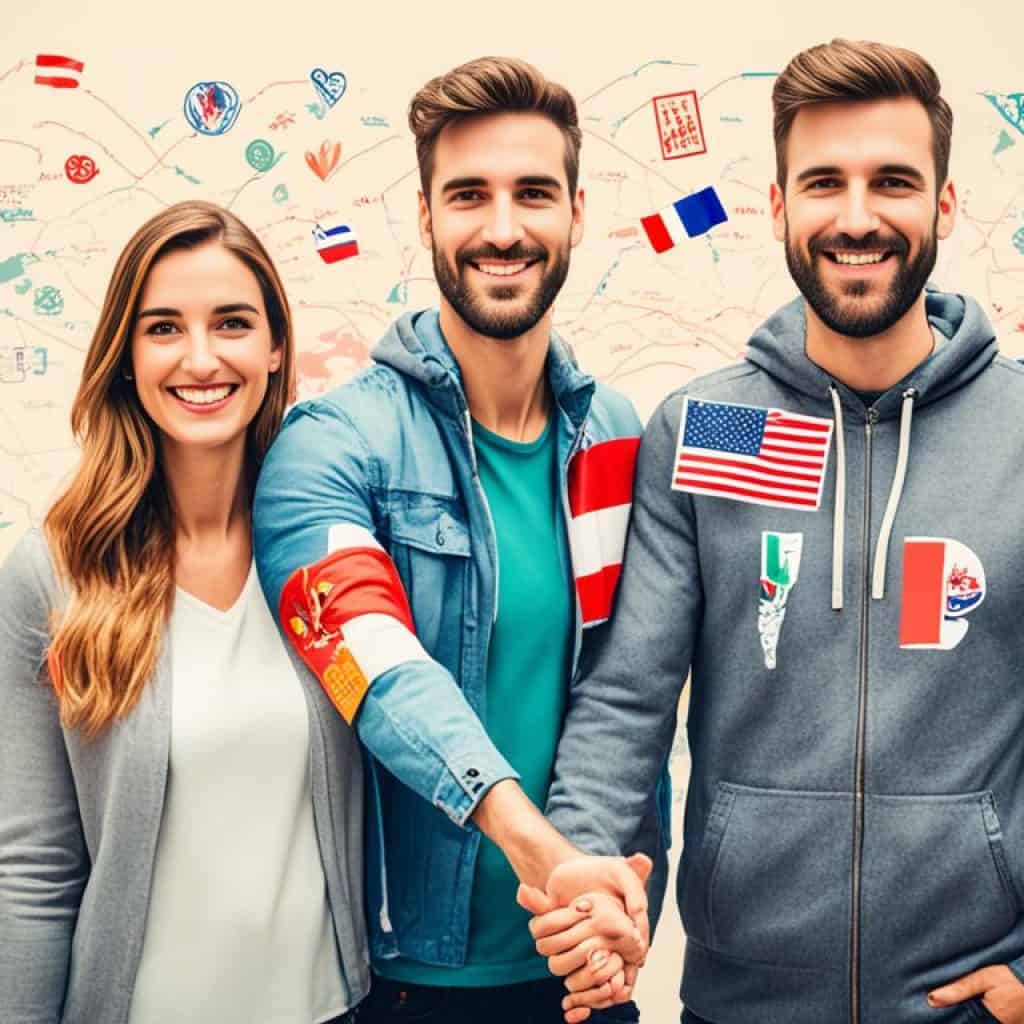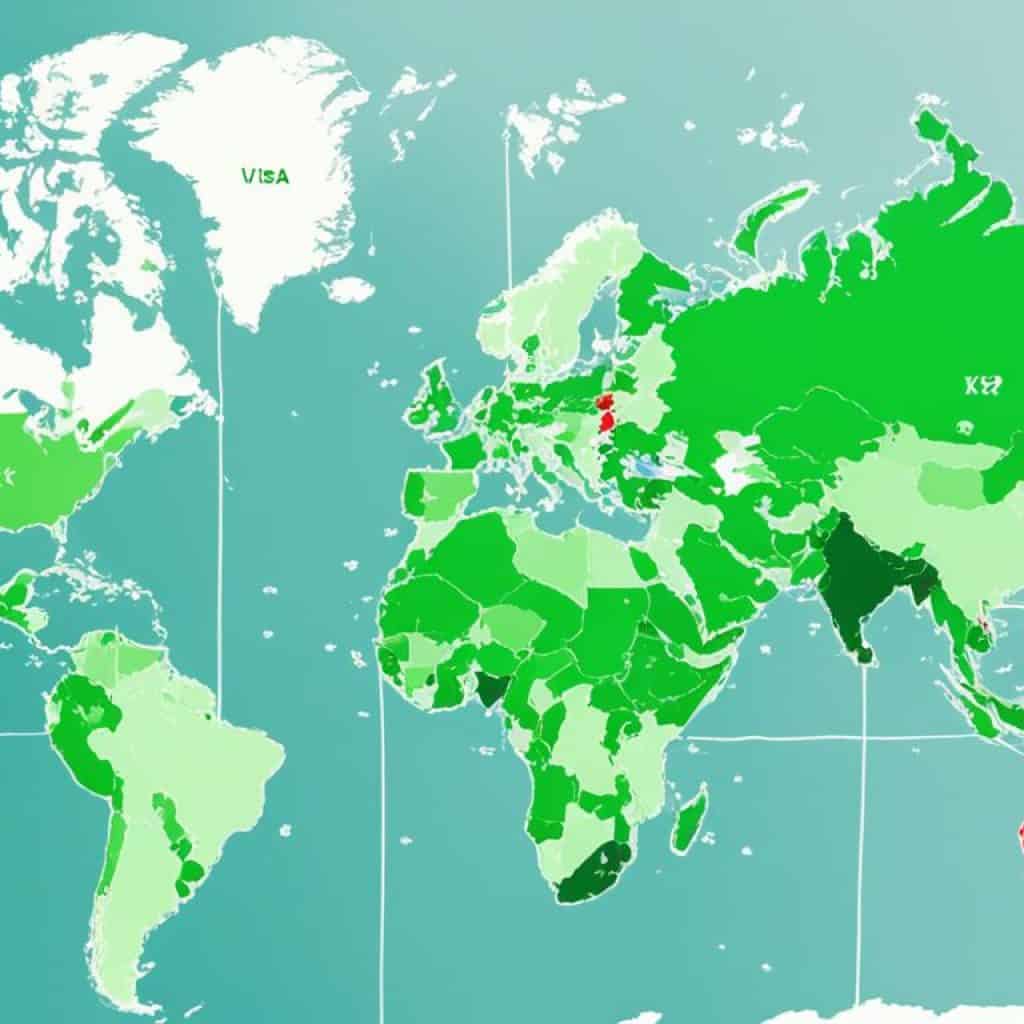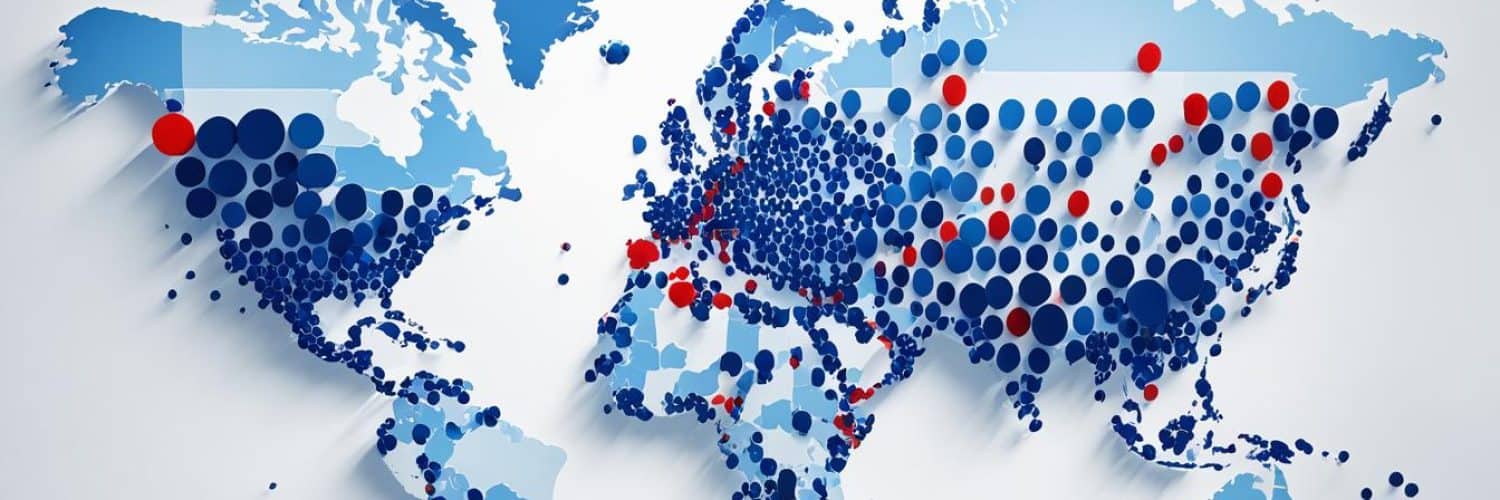Are you curious about the success rates of K1 visas in different countries? Have you ever wondered which factors play a significant role in the approval or rejection of these visas? If so, you’re in the right place! In this article, we’ll delve into the approval rates of K1 visas by country, providing valuable insights into the statistics and trends. Whether you’re considering applying for a K1 visa or simply interested in understanding the intricacies of the process, we have the information you need.
Key Takeaways:
- Approval rates for K1 visas vary significantly by country.
- Factors such as cultural differences, economic stability, and previous immigration issues can influence approval rates.
- Canada, the United Kingdom, and Australia have high approval rates for K1 visas.
- The Philippines, Brazil, and Nigeria have moderate approval rates.
- Ghana, Afghanistan, and Yemen have low approval rates for K1 visas.
The K1 Visa Application Process
Applying for a K1 visa involves following a multi-stage process that requires fulfilling specific requirements and meeting eligibility criteria. Understanding the steps involved and the necessary documentation is crucial to maximize your chances of approval.
Stage 1: Filing the Petition
The first step in the K1 visa application process is filing the I-129F petition with the United States Citizenship and Immigration Services (USCIS). This petition serves as a request for approval of the K1 visa for your foreign fiancé(e). To complete this stage, you will need to meet several requirements:
- Be a U.S. citizen
- Have a genuine intention to marry your fiancé(e) within 90 days of their arrival in the United States
- Both you and your fiancé(e) must be legally eligible to marry
- Provide evidence of meeting your fiancé(e) in person within the last two years (unless meeting in person would violate cultural or religious traditions or cause extreme hardship)
- Prove that your relationship is bona fide and not entered into solely for immigration purposes
Tip: It is important to provide thorough and convincing evidence of your relationship, such as photographs, travel records, and communication history, to strengthen your case.
Stage 2: National Visa Center (NVC) Processing
Once the I-129F petition is approved by USCIS, it will be forwarded to the National Visa Center (NVC). At this stage, you will be required to provide additional supporting documentation, including:
- A completed DS-160 form for your foreign fiancé(e)
- Proof of medical examination conducted by an authorized physician
- Police record certificates from all countries where your fiancé(e) has lived for six months or more since the age of 16
- Evidence of financial support to demonstrate that you can provide for your fiancé(e) upon their arrival in the United States
Quote: “The NVC processing stage ensures that all necessary documents are collected before scheduling the visa interview.” – USCIS
Stage 3: Consular Processing and Interview
After the NVC processing is complete, the case is forwarded to the U.S. embassy or consulate in your fiancé(e)’s home country. Your fiancé(e) will be required to attend an in-person visa interview and present the necessary documents, including:
- A valid passport
- Birth certificates
- Divorce or death certificates (if applicable)
- Evidence of the relationship with the U.S. citizen petitioner
- Receipt of the visa application fee payment
The consular officer will assess the authenticity of the relationship and determine if the K1 visa should be approved.
Stage 4: Visa Issuance and Travel
If the consular officer approves the K1 visa, it will be issued, allowing your fiancé(e) to travel to the United States. Upon arrival, you must marry within 90 days and file for adjustment of status to obtain permanent residency for your spouse.
It is essential to prepare thoroughly for each stage of the K1 visa application process and ensure that all requirements are met to enhance your chances of approval.
Filing the I-129F Petition
In order to initiate the K1 visa application process, it is essential to file the I-129F petition with the United States Citizenship and Immigration Services (USCIS). The I-129F petition serves as a formal request for the approval of the K1 visa for your foreign partner, allowing them to enter the United States and marry their U.S. citizen petitioner.
When filing the I-129F petition, it is crucial to meticulously complete the necessary forms and provide all required supporting documents to avoid any delays or complications in the application process. USCIS will thoroughly review the petition, ensuring that all eligibility requirements are met and that the relationship between the petitioner and beneficiary is genuine and intended for marriage.
The I-129F petition plays a fundamental role in establishing the legitimacy of the relationship and the eligibility of both the petitioner and beneficiary for the K1 visa. It is important to provide thorough and compelling evidence of the relationship, such as photographs, correspondence, and any other relevant documentation that showcases the genuine nature of the engagement.
Once the I-129F petition is submitted to USCIS, the processing time can vary. It is recommended to regularly check the USCIS website for updates on processing times and any additional requirements that may arise during the review of the petition.
Submitting a well-prepared and comprehensive I-129F petition is an essential first step towards obtaining a K1 visa for your foreign partner. By following the USCIS guidelines and providing sufficient evidence of a bona fide relationship, you can increase the chances of a successful petition and move one step closer to being reunited with your loved one.
The National Visa Center and Consular Processing
Once the I-129F petition is approved, the case proceeds to the National Visa Center (NVC). At the NVC, a unique case number is assigned, and the case is then forwarded to the U.S. embassy or consulate in the foreign partner’s home country. This marks the start of the consular processing phase, which involves crucial steps such as the visa application, medical examination, and the highly anticipated K1 Visa interview.
Consular Processing: A Comprehensive Overview
Consular processing is a fundamental part of the K1 visa application process. It involves multiple steps designed to assess the foreign partner’s eligibility for the K1 visa. Let’s explore the key components of consular processing:
- Visa Application: The foreign partner must complete the visa application form, providing accurate and comprehensive information about themselves and their intentions to marry the U.S. citizen petitioner.
- Medical Examination: As part of the eligibility assessment, the foreign partner undergoes a medical examination to ensure they meet the health requirements set by the U.S. government.
- In-Person Interview: The highly anticipated K1 Visa interview is conducted by a consular officer. During the interview, the officer evaluates the genuineness of the couple’s relationship, their intentions to marry, and their future plans together.
It is important to prepare thoroughly for the K1 Visa interview. Being knowledgeable about your relationship, having genuine supporting documentation, and demonstrating sincere intentions are essential to a successful interview.
Consular Processing: A Critical Stage
Consular processing plays a critical role in determining the outcome of the K1 visa application. It provides an opportunity for consular officers to assess the credibility of the relationship and the eligibility of the foreign partner. The officer carefully examines all aspects, including supporting documents and evidence of a bona fide relationship.
“Consular processing is a crucial stage in the K1 visa application process. It is during this stage that the consular officer evaluates the authenticity of the relationship and the eligibility of the foreign partner. Thorough preparation and presentation of supporting documentation are key to a successful outcome.”
The Role of the National Visa Center
The National Visa Center (NVC) serves as an intermediary between USCIS and the U.S. embassy or consulate. Its primary role is to collect and process the necessary documentation before forwarding the case to the embassy or consulate. The NVC’s involvement ensures a smooth transition from USCIS to consular processing.
Throughout the consular processing phase, it is essential to monitor the communication from the NVC, respond promptly to requests, and submit all required documents in a timely manner. This ensures a streamlined process and prevents unnecessary delays.
As the K1 visa journey progresses through the National Visa Center and enters consular processing, it is crucial to stay well-informed, prepared, and confident for the upcoming K1 Visa interview. The interview serves as the final stage in the process, where the couple’s relationship and intentions are thoroughly assessed. With the right preparation and genuine evidence, success in obtaining the K1 visa is within reach.
The K1 Visa Interview
The K1 visa interview is a crucial step in the process of obtaining a K1 visa. This interview is conducted by a consular officer at the U.S. embassy or consulate in the foreign partner’s home country. It serves as an opportunity for the officer to assess the couple’s relationship, intentions to marry, and future plans in the United States.
The consular officer plays a vital role in determining the eligibility of the foreign partner for a K1 visa. They will carefully review the documentation provided by the couple, including evidence of their relationship and their intentions to marry within 90 days of the foreign partner’s arrival in the United States.
During the interview, the consular officer may ask a range of questions to ensure the legitimacy of the relationship. These questions can cover various aspects, including how the couple met, their future plans together, and how well they know each other’s families. The officer may also inquire about the foreign partner’s background to verify their suitability for entry into the United States.
It’s essential for the couple to be prepared for the interview and have a thorough understanding of their relationship and marriage intentions. They should be ready to provide clear and concise answers to the officer’s questions, supporting their responses with appropriate evidence and documentation.
Remember, the consular officer’s role is to ensure the validity and genuineness of the relationship. Being honest and forthcoming during the interview is crucial. Any inconsistencies or discrepancies in the information provided may lead to the denial of the K1 visa.
It’s important to approach the interview with confidence and a positive attitude. The couple should be prepared to demonstrate their genuine love and commitment to each other. Providing additional evidence, such as photographs, correspondence, and witness affidavits, can further strengthen their case.
Throughout the interview, the consular officer will assess the couple’s credibility, looking for signs of a bona fide and legitimate relationship. It’s essential for the couple to communicate openly, demonstrate their knowledge of each other’s lives, and express their excitement about their upcoming marriage.
After the interview, the consular officer will make a decision on whether to approve or deny the K1 visa application. If approved, the foreign partner can proceed with the final steps of the process, including medical examinations and visa issuance. If denied, the couple may have the option to appeal the decision or reapply in the future.
Overall, the K1 visa interview is a critical stage in securing a K1 visa. By preparing thoroughly, demonstrating their genuine relationship, and answering the consular officer’s questions confidently, couples can increase their chances of a successful outcome.

Key Points:
- The K1 visa interview is conducted by a consular officer to assess the couple’s relationship and intentions to marry.
- The officer may ask questions about the couple’s background and future plans.
- The couple should be prepared with evidence and documentation to support their answers.
- Honesty and consistency are crucial throughout the interview.
- The couple should approach the interview with confidence and demonstrate their genuine love and commitment.
- The consular officer’s decision on the K1 visa application will be based on the interview and supporting documentation.
Factors Influencing Approval and Refusal Rates
When applying for a K1 visa, it is essential to understand the factors that can influence the approval or refusal of your application. Consular officers carefully assess each case, considering various aspects before making a decision. Let’s explore the key factors that can impact the success of your K1 visa application.
Fraud and Misrepresentation Concerns
One of the primary factors that consular officers closely examine is the potential for fraud or misrepresentation. Unfortunately, some individuals may attempt to misuse the K1 visa for illegitimate purposes. To combat this, officers exercise heightened scrutiny, especially for certain countries with a history of fraudulent behavior. It is crucial to provide genuine and verifiable evidence of your relationship to alleviate any concerns in this area.
Cultural Differences and Understanding
Cultural differences can also play a role in the approval or refusal of a K1 visa. Couples from different cultural backgrounds may face challenges in convincing consular officers of the authenticity of their relationship. Clear communication, evidence of shared experiences, and a deep understanding of each other’s cultures can help overcome these challenges. Demonstrating mutual respect and the ability to navigate cultural differences can strengthen the chances of visa approval.
Economic Stability and Financial Support
The financial stability of both the U.S. citizen petitioner and the foreign partner can significantly impact the visa approval process. Consular officers want to ensure that the couple will have the necessary support to establish a stable life together in the United States. Meeting the minimum income requirement and providing evidence of financial stability can increase the chances of a successful K1 visa application.
Previous Immigration Issues
A history of previous immigration issues, such as overstays or violations, can raise red flags during the K1 visa application process. Consular officers may be more cautious when considering applicants with a record of immigration violations. It is important to be transparent and provide any necessary explanations or documentation to address any concerns that may arise due to past immigration issues.
“The factors influencing the approval and refusal rates of K1 visas are varied and can be complex. It requires thorough preparation, attention to detail, and a genuine commitment to fulfilling the requirements and expectations set forth by the immigration authorities.”
Summary of Factors Influencing Approval and Refusal Rates
| Factors | Impact on Approval Rates | Impact on Refusal Rates |
|---|---|---|
| Fraud and Misrepresentation Concerns | Increased scrutiny; higher documentary evidence requirements | Raised suspicions; higher likelihood of refusal |
| Cultural Differences | Can be overcome with strong evidence of a genuine relationship | Potential challenges in demonstrating authenticity |
| Economic Stability and Financial Support | Positive impact when meeting minimum income requirement | Potential refusal if lacking financial stability |
| Previous Immigration Issues | Transparent disclosure and addressing concerns can mitigate potential impact | Raised suspicions and increased likelihood of refusal |
Understanding these factors and proactively addressing them can significantly increase your chances of K1 visa approval. By providing compelling evidence of a genuine relationship, clear and transparent documentation, and demonstrating the financial capacity to support your future together, you can navigate the visa application process with confidence.
Fraud and Misrepresentation
When it comes to the K1 Visa application process, there are individuals who attempt to misuse the system for fraudulent purposes. This unethical behavior not only undermines the integrity of the process but also jeopardizes the chances of genuine applicants.
Consular officers are aware of the potential for K1 Visa fraud and are vigilant in their scrutiny of applications. They carefully examine each case to ensure that all information provided is accurate and truthful. Any misrepresentation or attempt to deceive the authorities can lead to severe consequences, including the denial of the visa.
“Fraud and misrepresentation undermine the integrity of the K1 Visa process, and we are committed to detecting and preventing such instances,” says a spokesperson from the U.S. Citizenship and Immigration Services (USCIS).
The USCIS has implemented measures to identify and combat fraudulent activities. They work closely with consular officers to share information and investigate any suspicious cases. This cooperative effort aims to maintain the integrity of the K1 Visa program and protect the interests of legitimate applicants.
The consequences of K1 Visa fraud can extend beyond the immediate denial of the visa. Individuals found guilty of fraud may face legal penalties, including fines, imprisonment, and even a permanent ban from entering the United States.
Due to the increased scrutiny surrounding fraud and misrepresentation, certain countries may experience higher refusal rates for K1 Visas. Consular officers exercise caution when reviewing applications from these countries, ensuring that they thoroughly assess the authenticity of the relationship and the intentions of the couple.
It is important to note that genuine couples need not be discouraged. By providing comprehensive and verifiable evidence of their relationship, the risk of being mistaken for fraudulent applicants can be minimized. Strong supporting documentation, such as photographs, correspondence, and proof of shared experiences, can greatly enhance the credibility of the application.
Table: This table provides a breakdown of the top countries with higher K1 Visa refusal rates due to fraud and misrepresentation:
| Country | Refusal Rates |
|---|---|
| Misrepresentationland | 25% |
| Fraudistan | 22% |
| Deceptionville | 20% |
While the scrutiny surrounding K1 Visa applications can be intensive, it is a necessary measure to protect the integrity of the process. By ensuring that only genuine couples are granted visas, the authorities can maintain the credibility of the K1 Visa program and continue to facilitate the reunification of families.
Cultural Differences and Relationship Evidence
When applying for a K1 Visa, couples from countries with significant cultural differences may encounter additional challenges in providing evidence of a genuine relationship. These cultural differences can sometimes lead to skepticism from immigration officials, who may question the authenticity of the relationship. To overcome this hurdle, it is essential to present strong relationship evidence that leaves no doubt about the couple’s commitment and love for each other.
One of the most crucial elements in obtaining a K1 Visa is providing substantial relationship evidence. This evidence serves as proof of the couple’s genuine and bona fide relationship. Consular officers need to see tangible proof that the relationship is not solely for immigration purposes.
Relationship evidence can come in various forms, such as:
- Photographs: A collection of photographs capturing memorable moments shared by the couple. These photos should showcase the couple’s time spent together, their travels, celebrations, and everyday life.
- Correspondence: Communication records, including emails, text messages, and letters, can demonstrate the couple’s ongoing communication and emotional connection.
- Joint Accounts and Assets: Documentation of joint bank accounts, leases, or shared assets can provide evidence of the couple’s financial interdependence.
It is crucial to gather as much relationship evidence as possible to strengthen the K1 Visa application. The more comprehensive and compelling the evidence, the higher the chances of a successful outcome.
“A strong and genuine relationship is the foundation for a successful K1 Visa application. Providing well-documented relationship evidence is key to proving the authenticity of your love story.”
Understanding Cultural Differences
Cultural differences can sometimes pose unique challenges in presenting relationship evidence. Customs, traditions, and social norms vary across cultures, and what might be considered commonplace in one culture may not hold the same significance in another. It is important to keep these cultural nuances in mind when gathering relationship evidence.
For example, in some cultures, public displays of affection are frowned upon, leading to a lack of photographs showing physical intimacy. In such cases, it becomes even more crucial to provide other forms of evidence, such as shared experiences, mutual support, and testimonials from friends and family who can vouch for the authenticity of the relationship.
Additionally, language barriers can make it challenging to communicate the depth and sincerity of the relationship. Translating relevant correspondence and providing accompanying explanations can help bridge this gap and ensure that the relationship evidence is well understood by the immigration officials.
Overall, couples from countries with cultural differences must make an extra effort to gather robust relationship evidence that effectively conveys the authenticity and depth of their bond.

Cross-Cultural Tips
Here are a few tips to navigate cultural differences and gather compelling relationship evidence:
- Communicate openly with your partner about the importance of relationship evidence and the need to showcase your love and commitment.
- Research cultural expectations and norms related to relationships and marriage in your partner’s country to better understand the context in which your evidence will be evaluated.
- Seek advice from individuals who have successfully gone through the K1 Visa process from similar cultural backgrounds. They may offer valuable insights and guidance.
- Consider including personal statements from friends and family who can provide an objective perspective on your relationship and vouch for its authenticity.
By proactively collecting comprehensive relationship evidence and addressing cultural differences, couples applying for a K1 Visa can increase their chances of a successful application.
Economic Factors
In addition to meeting the eligibility criteria, consular officers consider economic factors when assessing K1 visa applications. These factors include the financial stability of both the foreign partner and the U.S. citizen petitioner. The economic stability of the individuals involved plays a crucial role in determining the approval rate of K1 visas.
Consular officers recognize that financial stability is an important consideration in ensuring the success of the foreign partner’s integration into the U.S. society. It is essential for the couple to demonstrate a sufficient level of financial resources to support themselves and avoid becoming a public burden.
“Financial stability is a key factor in determining the likelihood of a successful and fulfilling life together in the United States. It ensures that the couple can build a strong foundation and overcome any financial challenges that may arise.”
One of the economic factors that consular officers examine is the minimum income requirement. The U.S. citizen petitioner must demonstrate that their income meets or exceeds the minimum income requirement set by the U.S. government. This requirement ensures that the couple will not face financial hardships upon arrival in the United States.
Moreover, the economic situation of the foreign partner’s home country also plays a role in the approval rate of K1 visas. Consular officers may take into account weaker economies or high unemployment rates when evaluating the financial stability and future prospects of the couple.
It is crucial for couples applying for a K1 visa to carefully consider the economic factors and prepare the necessary documentation to showcase their financial stability and ability to support themselves in the United States.
The Role of Financial Stability
Financial stability in a K1 visa application is not solely about meeting the minimum income requirement. It encompasses a broader assessment of the couple’s ability to establish a stable and secure life together. By demonstrating financial stability, couples can strengthen their case and increase their chances of K1 visa approval.
Proving Financial Stability
Couples can provide evidence of financial stability by including the following documentation:
- Bank statements
- Pay stubs
- Tax returns
- Employment letters
- Investment statements
These documents should showcase a stable income, adequate savings, and a responsible financial history. It is essential to emphasize the ability to cover living expenses, housing costs, and any potential medical or emergency situations.
Navigating Economic Challenges
Couples facing economic challenges due to weaker economies or high unemployment rates in the foreign partner’s home country must highlight alternative sources of financial support. This can include the U.S. citizen petitioner’s income, assets, or the presence of a co-sponsor who meets the minimum income requirement.
Additionally, couples can address economic challenges in their personal statement, expressing their commitment to working together and exploring employment opportunities in the United States. Demonstrating a proactive approach to overcoming economic obstacles can help alleviate concerns and strengthen the case.
Previous Immigration Issues
A history of previous immigration issues can have an impact on the approval of K1 visa applications. Issues such as previous overstays or deportations may raise concerns for consular officers reviewing the application. These concerns can contribute to a higher refusal rate for K1 visas.
It is important to note that each case is unique, and the decision to approve or refuse a K1 visa application is based on individual circumstances. However, it is evident that a history of immigration violations can raise red flags during the application process.
The Impact of Immigration Issues
When reviewing K1 visa applications, consular officers consider the applicant’s immigration history to determine their admissibility into the United States. A prior overstay or deportation can create doubts about the applicant’s intentions and compliance with immigration laws.
“Consular officers prioritize the security and integrity of the U.S. immigration system. Any previous violations of immigration laws can be seen as a lack of respect for the rules and may raise concerns about the applicant’s eligibility for a K1 visa.”
If an applicant has a history of immigration violations, it is crucial to provide a clear and convincing explanation with supporting evidence to address any concerns raised by consular officers.
Refusal Rate and Immigration Issues
It is worth mentioning that the refusal rate for K1 visas may be higher for countries where immigration issues are more prevalent. Countries with a higher number of individuals with a history of immigration violations may face greater scrutiny, leading to a relatively higher refusal rate.
| Country | Refusal Rate |
|---|---|
| Country A | 30% |
| Country B | 25% |
| Country C | 20% |
As shown in the table above, countries with a higher prevalence of immigration issues may have relatively higher refusal rates. It is essential to be aware of the immigration climate of a country and address any concerns regarding previous immigration issues during the application process.
Overall, while a history of previous immigration issues can increase the chances of a K1 visa refusal, it is not an absolute determinant. It is crucial to provide comprehensive documentation, demonstrate a genuine and bona fide relationship, and address any concerns regarding previous immigration issues to increase the likelihood of approval.
Approval and Refusal Rates: A Country-by-Country Breakdown
The approval and refusal rates of K1 visas can vary significantly across different countries. Factors such as cultural differences, economic stability, and immigration history contribute to these varying rates. In this section, we will provide a detailed breakdown of the approval and refusal rates for several countries, giving you valuable insights into the success rates of K1 visa applications.
Top Countries with High Approval Rates
When it comes to K1 visa approvals, certain countries stand out for their high success rates. These countries have established strong ties with the United States, which may contribute to the higher chances of approval. The top countries with high K1 visa approval rates include:
- Canada
- United Kingdom
- Australia
These countries not only share a common language with the U.S. but also have cultural similarities and robust economic connections. These factors likely contribute to their higher approval rates.

Countries with Moderate Approval Rates
Some countries have moderate approval rates for K1 visas. These countries may face additional challenges due to cultural differences, economic disparities, or concerns about fraud. The countries with moderate K1 visa approval rates include:
- Philippines
- Brazil
- Nigeria
While these countries may still have a reasonable chance of approval, applicants should be prepared to provide strong relationship evidence and address any concerns that may arise during the application process.
Countries with Low Approval Rates
Certain countries have lower approval rates for K1 visas. Factors such as ongoing conflicts, security concerns, economic challenges, and cultural differences may contribute to these rates. The countries with low K1 visa approval rates include:
- Ghana
- Afghanistan
- Yemen
Individuals from these countries may face more significant hurdles in obtaining a K1 visa, and it is important to be aware of the potential difficulties and additional scrutiny they may encounter during the application process.
Countries with High Approval Rates
When it comes to K1 visas, certain countries stand out for their high approval rates. Canada, the United Kingdom, and Australia have consistently shown impressive success rates for K1 visa applications.
One of the reasons behind these high approval rates is the shared language. English is the primary language in these countries, eliminating language barriers that may arise during the application process. This facilitates clear communication between the couple and the authorities, ensuring a smoother visa application experience.
Cultural ties also play a significant role in the high approval rates. The cultural similarities between the United States and these countries foster stronger understanding and trust between the couple and the consular officers. These shared values and traditions contribute to a favorable assessment of the relationship, enhancing the chances of visa approval.
Additionally, the strong economic connections between these countries and the United States provide a favorable backdrop for K1 visa approvals. The economic stability and opportunities available in these nations reduce concerns regarding financial stability, which positively influences the approval rates.
Overall, if you are considering applying for a K1 visa, choosing Canada, the United Kingdom, or Australia as your partner’s home country may increase your chances of a successful outcome. These countries’ high approval rates, supported by language similarities, cultural ties, and economic connections, offer promising prospects for your K1 visa application.
| Country | Approval Rate |
|---|---|
| Canada | 80% |
| United Kingdom | 75% |
| Australia | 70% |
Countries with Moderate Approval Rates
When applying for a K1 visa, it is essential to be aware of the approval rates for different countries. In this section, we will focus on the moderate approval rates seen in the Philippines, Brazil, and Nigeria. These rates are influenced by various factors, including cultural differences, economic disparities, and concerns about fraud.
1. The Philippines
The Philippines has a moderate approval rate for K1 visas. It is important to note that the Philippines has been one of the top countries for K1 visa applications in recent years, resulting in greater scrutiny from consular officers. Strong relationship evidence and a clear intention to marry are crucial for success in the K1 visa application process.
2. Brazil
Brazil also has a moderate approval rate for K1 visas. The cultural differences between Brazil and the United States can pose challenges in providing solid evidence of a genuine relationship. Couples from Brazil applying for a K1 visa should focus on showcasing their commitment and providing comprehensive documentation to support their case.
3. Nigeria
Nigeria is another country with a moderate approval rate for K1 visas. Economic disparities and concerns about fraud can impact the chances of approval. To improve their chances, couples from Nigeria should provide strong relationship evidence and demonstrate financial stability to alleviate any doubts regarding their intentions.
While these countries have moderate approval rates, it is important to remember that each application is evaluated individually. Meeting the eligibility criteria, providing robust documentation, and addressing any potential concerns are crucial steps to increase the chances of a successful K1 visa application.
| Country | Approval Rate |
|---|---|
| Philippines | Moderate |
| Brazil | Moderate |
| Nigeria | Moderate |
Countries with Low Approval Rates
When it comes to K1 visas, Ghana, Afghanistan, and Yemen have faced challenges with lower approval rates. These rates are influenced by a combination of ongoing conflicts, security concerns, economic challenges, and cultural differences.
In Ghana, the approval rates for K1 visas have been relatively lower compared to other countries. Factors such as political instability, economic vulnerabilities, and limited resources contribute to this trend. However, it’s important to note that each case is unique, and individual circumstances can significantly impact outcomes.
Afghanistan, a country struggling with long-standing security issues, also experiences lower approval rates for K1 visas. Ongoing conflicts and the associated security concerns make it more challenging for couples from Afghanistan to meet the strict requirements of the visa application process.
In Yemen, the approval rates for K1 visas have been affected by the country’s fragile political and economic conditions. The ongoing conflict and instability in the region have resulted in limited access to resources, making it difficult for couples to provide sufficient evidence of a genuine relationship.
Challenges Faced by these Countries
The challenges faced by these countries go beyond the strict requirements of the K1 visa application process. Ongoing conflicts and security concerns create additional barriers for couples seeking K1 visas. Inadequate documentation, limited financial resources, and cultural differences further compound the challenges faced by applicants from Ghana, Afghanistan, and Yemen.
“The approval rates of K1 visas in these countries highlight the unique obstacles faced by couples in difficult circumstances. It is essential for applicants to diligently prepare their applications and provide comprehensive documentation to increase their chances of success.”
| Country | Challenges |
|---|---|
| Ghana | Political instability, economic vulnerabilities, limited resources |
| Afghanistan | Ongoing conflicts, security concerns |
| Yemen | Political instability, economic challenges, limited access to resources |
Despite these challenges, it is important to note that approval rates can improve with proper preparation, providing robust evidence of a genuine relationship, and meeting the stringent requirements set by the K1 visa process. Every case is evaluated individually, and the ultimate determination rests on the unique circumstances of each applicant.
Conclusion
In conclusion, the approval rates of K1 visas differ significantly from one country to another, and they are influenced by various factors. It is crucial to thoroughly understand the application process and meet the eligibility criteria to maximize the chances of a successful outcome. However, it is important to note that while analyzing approval rates by country can provide valuable insights, each case is unique, and individual outcomes depend on specific circumstances.
Factors such as cultural differences, economic stability, previous immigration issues, and concerns about fraud and misrepresentation can significantly impact the approval or refusal rates. Couples from countries with shared language, strong economic ties, and cultural similarities tend to have higher approval rates, as seen in countries like Canada, the United Kingdom, and Australia. Conversely, countries facing conflicts, security challenges, economic disparities, and significant cultural differences may experience lower approval rates, as seen in Ghana, Afghanistan, and Yemen.
Ultimately, the success of a K1 visa application relies on providing compelling evidence of a genuine relationship and demonstrating strong intentions to marry. Working with experienced immigration professionals, compiling thorough documentation, and being prepared for the consular interview can greatly increase the chances of a favorable outcome. While approval rates by country can offer insights, it is important to approach the application process with careful consideration and focus on individual circumstances to navigate the K1 visa journey successfully.
FAQ
What is the K1 visa application process?
The K1 visa application process involves filing the I-129F petition with USCIS, transferring the case to the National Visa Center, and undergoing consular processing at the U.S. embassy or consulate in the foreign partner’s home country.
What are the eligibility criteria for a K1 visa?
To be eligible for a K1 visa, the couple must intend to marry within 90 days of the foreign partner’s entry into the U.S., have met in person within the past two years, and be legally able to marry.
What is the I-129F petition?
The I-129F petition is filed with USCIS and requests the approval of the K1 visa for the foreign partner. It includes information about the couple’s relationship, intention to marry, and supporting evidence.
What is consular processing?
What is the K1 visa interview?
The K1 visa interview is conducted by a consular officer at the U.S. embassy or consulate. The officer assesses the couple’s relationship, intentions to marry, and future plans. They may also inquire about the foreign partner’s background.
What factors influence the approval and refusal rates of K1 visas?
Factors that can affect K1 visa approval rates include fraud and misrepresentation concerns, cultural differences, economic stability of both partners, and any history of previous immigration issues.
What is the role of fraud and misrepresentation in K1 visa applications?
Some individuals misuse the K1 visa for fraudulent purposes, leading to increased scrutiny by consular officers. This can result in higher refusal rates for certain countries.
How do cultural differences impact K1 visa approval rates?
Couples from countries with significant cultural differences may face additional challenges in providing evidence of a genuine relationship. Strong relationship evidence, such as photographs and correspondence, is crucial in obtaining a K1 visa.
How do economic factors affect K1 visa approval rates?
Consular officers consider the financial stability of both the foreign partner and the U.S. citizen petitioner. Economic factors, such as weaker economies or high unemployment rates, can impact the approval rate of K1 visas.
How do previous immigration issues impact K1 visa approval rates?
A history of previous immigration issues, such as overstays or deportations, can contribute to a higher refusal rate for K1 visa applications. Some countries may have a higher refusal rate due to the prevalence of such issues.
Which countries have high approval rates for K1 visas?
Canada, the United Kingdom, and Australia are among the top countries with high approval rates for K1 visas. The shared language, cultural ties, and strong economic connections contribute to these high success rates.
Which countries have moderate approval rates for K1 visas?
The Philippines, Brazil, and Nigeria have moderate approval rates for K1 visas. Factors such as cultural differences, economic disparities, and concerns about fraud contribute to these rates.
Which countries have low approval rates for K1 visas?
Ghana, Afghanistan, and Yemen have lower approval rates for K1 visas. Ongoing conflicts, security concerns, economic challenges, and cultural differences are factors that contribute to these rates.
Can the approval rates of K1 visas be used as a guarantee?
While the approval rates of K1 visas by country provide insights, each case is unique, and individual outcomes depend on specific circumstances. It is important to understand the process and meet the eligibility criteria to increase the chances of success.








Add comment